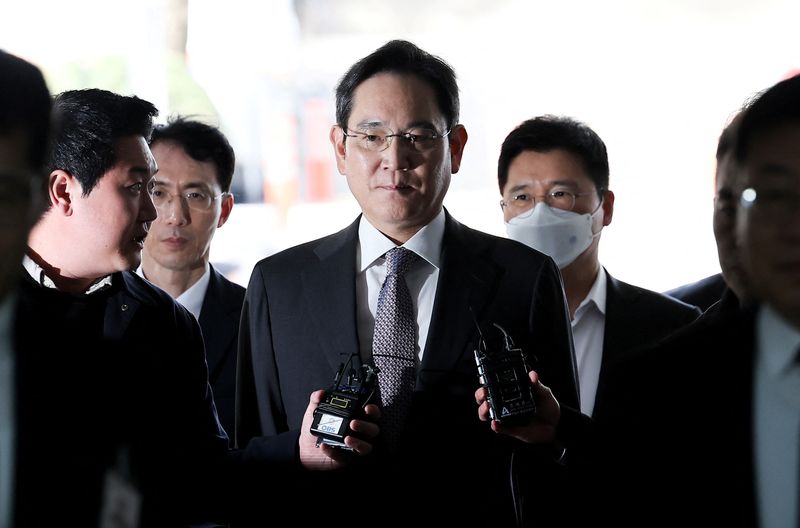By Hyunjoo Jin
SEOUL (Reuters) -South Korean prosecutors requested on Monday a five-year jail term for Samsung Electronics (KS:005930) Chairman Jay Y. Lee over actions in a controversial merger of affiliates that helped solidify his control in a case being tried at an appeals court.
Lee was found not guilty in February of accounting fraud and stock manipulation by a Seoul Central District Court but the prosecutors appealed the ruling.
The appeal hearings, which wrap up on Monday, come as Lee faces growing questions about his ability to lead Samsung, the world's top memory chip and smartphone maker, as it grapples with slowing profits and falling stock prices.
Lee and other former executives had been accused of engineering a merger between two Samsung affiliates - Samsung C&T and Cheil Industries - in a way that dealt poorly with the interests of minority shareholders.
In the closing arguments, state prosecutors said Lee acted in the merger to benefit his personal standing as the de facto leader of the Samsung conglomerate, at the expense of shareholders and investors. Lee and other executives denied the allegations.
Lee, a third-generation leader of the Samsung Group, has been dogged over the past decade by lawsuits, jail time and attacks from foreign hedge fund Elliott over the 2015 merger of the affiliates that helped tighten his grip on the sprawling conglomerate, after his father was hospitalised due to a heart attack in 2014.
If the higher court upholds the ruling by the lower court, it will help give Lee a freer rein in steering the country's biggest conglomerate, unless the prosecution appeals the decision to the top court.
“I am fully aware that there are grave concerns about the future of Samsung recently," Lee said during his final statement.
“The reality that we faced is challenging more than ever,” he said, pledging to overcome the difficulties and asking the judge to give him an opportunity for him to reinvent Samsung.
Other executives also asked the judge to help Samsung overcome the crisis and contribute to the national economy.

Samsung has lagged behind smaller rival SK Hynix in tapping booming demand for AI chips from Nvidia (NASDAQ:NVDA). Samsung has also seen the gap widening with TSMC, a dominant player in producing chips designed by customers like Apple (NASDAQ:AAPL) and Nvidia.
Worries about the impact of U.S. tariffs under the impending new administration of U.S. President-elect Donald Trump have also weighed on Samsung shares, which have fallen more than 25% so far this year.